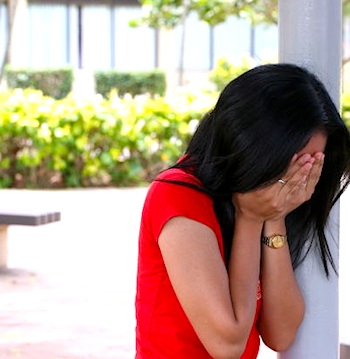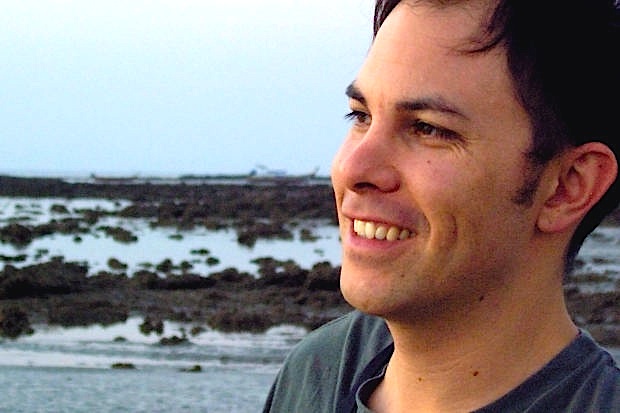Grieving a loss is a natural, necessary response

Grieving a loss is a normal part of life, but sometimes the process is frightening when you're in the middle of it. Single people, especially, feel even more alone when someone or something important is taken away.
When tragedy hits, it's wrong--and even unhealthy--to laugh it off as if nothing happened. Everyone needs to take time to grieve. This emotion provides a release for sadness and anger.
During my 40 years as a single adult, I've experienced almost every kind of loss you can imagine. Let's look at three types everybody suffers during their life.
Grieving a loss from death
When someone you love dies, your world feels shattered. The hurt is so great you actually feel physical pain. That's what happened when my father died in 1995.
He had been sick a couple months, but the doctors couldn't diagnose what was wrong. By the time we went to a larger hospital and they discovered it was cancer, nothing could be done.
I had to go back to work in another town while he was in the hospital. I remember vividly the phone call from my mother telling me Dad had died.
We knew it was coming, but that didn't diminish the pain. He was only 71, young by today's standards. His funeral was the worst day of my life. I had always been close to my parents, even going on vacation with them.
An overwhelming sense of heartache comes over you right away, and in the weeks that follow. Grieving a loss from death takes time, and the amount of time varies with each person. Don't let anyone tell you that you need to "snap out of it." Let the process work itself out.
You may feel a sense of fear or horror at your own mortality. That's normal too. The death of somebody you love is a shocking reminder that none of us lives forever.

It's healthy to cry. It releases pent-up emotions. It lets the hurt escape in a way that nothing else can. Sometimes, out of nowhere, a sudden burst of sadness may come over you. That's normal too.
If you feel angry or cheated by God, that's normal also, and nothing to
feel guilty about. I encourage you to talk with your pastor or a
trusted friend about what you're going through. Some people feel
uncomfortable about this. If they don't want to listen, find a friend
who has already experienced the death of a close loved one. They'll
understand and be compassionate.
It's very important to grieve at
your own pace. Eventually, over time, you will start to come out of
it. At first it may seem as if the hurt will never end, but gradually
you will find joy in life again. Remember that you don't have to mourn
the rest of your life. That does not honor your lost loved one.
If,
after a long time, you find that you cannot move on, I urge you to seek
counseling or professional help. We singles have a lot of time alone
to think, sometimes too much time. Regrets get magnified, guilt drags
us down. Your own mental health is crucial. Guard it as carefully as
you do your physical health.
Grieving a loss of a relationship
We all have dreams. Many of us want to get married. When we find a promising person then that relationship falls apart, it's a devastating sensation.
When it happened to me--more than once, I might add--I immediately started wondering what I did wrong. I reviewed all the time we had spent together, looking for mistakes I had made.
Whether you did or didn't make mistakes, it's wise to remember that you did the best you could at the time. None of us is perfect. We shouldn't expect to be. If the other person was looking for someone perfect, they were being immature, and they weren't being fair to you.
Grieving a loss from a broken relationship hurts as much as the death of a loved one, because a dream has died. In some ways, it's even worse, because the person is still alive and you may still be in love with them.
But there will be other people, and new dreams. Remember that.
Again, it takes time to heal. Brushing it off like nothing happened is foolish. You need to grieve the loss in your own way.
I'd like to set something straight right here. I think the idea of a "soulmate" is wrong, that it's New Age nonsense cooked up by somebody who was a couple cards short of a full deck. There is more than one person you can be happy with. We've all seen it with people who have a happy second marriage. Dismiss the notion that you lost the only perfect person for you.
At some point you should get back into life and start dating again, if marriage is your goal. Trust me, there's more than one perfect someone for you. But you won't find that person sitting at home, refusing to let go of something that's over.
Grieving a loss of a job
I got laid off from a job I loved. It wasn't my fault because it was a company-wide reduction in force. Still, it hurt. I had put in my best effort, but it wasn't enough. They wanted to cut the budget, and I got let go.
I quit three other jobs. With the first, I went back to college and got my master's degree. With the second, I had a sadistic boss who harassed everyone who worked for her. And with the third, I didn't like the direction the company was going and the ethically shaky things I was ordered to do.

Whether you quit, get laid off or fired, there will be some guilt and regret. In America, we have a fantasy that we're going to find our life's calling in our work. Most people I talk to enjoyed what they did but were driven nuts by the politics and bureaucracy. I don't think the perfect job exists.
Once more, you probably did the best you could at the time. And, if you objectively realize you messed up, it's a hard but important lesson to carry to your next job.
It's usually not helpful to second-guess yourself. That part of your life is over. What you can do is learn from your experience when you start your new job.
Some perspective on grieving a loss
As you grow older, you'll look back on the losses in your life and realize that they happen to everyone. God wasn't picking on you and you're not a bad luck person.
One of the best aspects of being a Christian is that God stands beside you in every single tragedy. We're not exempt, mind you, but we do have his strength to lean on. It's normal to question him, but don't expect answers. You and I probably wouldn't understand them even if he told us.
Recovering from a loss requires trust in God. Knowing that he loves you keeps you from getting bitter. You have to want to move on. Nobody can force you to. It's something you have to decide on your own, knowing that life, hope, and opportunities lie ahead, not behind.
Maturity never comes without pain. None of us escapes pain, but you don't have to live there. Moving past it is up to you. It's hard, but you can do it. If you're determined, you can find joy in life again.





